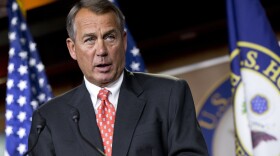Making an already head-splittingly difficult deal on the fiscal cliff even harder to resolve is a set of three rules by which the Republicans who run the House play.
These are not official regulations; they're more shibboleths that House GOP leaders have adopted in recent years. And those rules are leaving House Speaker John Boehner, R-Ohio, little room to maneuver as lawmakers try to avoid a set of tax increases and spending cuts set to take effect at the end of the year.
1. "The majority of the majority"
According to President Obama, keeping tax rates unchanged for the bottom 98 percent of taxpayers come Jan. 1 should be simple.
The Senate has already passed a bill freezing all but the top two rates of the Bush-era tax cuts, he told a group of factory workers on Friday. "If we can just get a few House Republicans on board, we can pass the bill in the House, it will land on my desk, and I am ready — I have got a bunch of pens ready — to sign this bill."
But that Senate bill has been stymied by the House GOP leadership's deference to what's known as "the majority of the majority." Under this de facto rule, no bill is brought up for a vote when Republicans control the House unless a majority of their caucus supports it.
So while there may well be enough Republicans willing to break ranks and vote with Democrats to pass that Senate bill, Rep. Tom Cole of Oklahoma, the GOP's deputy whip, said that's just not going to happen: "You're not going to come up here and be able to put together a deal with 170 Democrats and 40 Republicans — that's just not in the cards."
Longtime Congress-watcher Norm Ornstein of the American Enterprise Institute said the majority of the majority rule is a major reason why bills passed on a bipartisan basis in the Senate don't come up in the House.
"We've got the Republicans now as a parliamentary-style minority. In a parliamentary system, it is just a matter of course that the parties unite together in opposition to the other side," he said. "But you can't function that way with divided government."
2. Any increase in the debt ceiling must be matched by an equal decrease in spending
With the rise of the Tea Party came this rule governing increases in the nation's borrowing limit — and one has to happen very soon.
Boehner's insistence on such a dollar-for-dollar deal led to last year's debt ceiling crisis; last week he said he'll do the same this time.
"I continue to believe that any increase in the debt limit has to be accompanied by spending reductions that meet or exceed it," he said.
Ornstein says that when Boehner became speaker nearly two years ago, he privately warned fellow Republicans they would have to make some concessions as the governing party, especially when it came to raising the debt ceiling.
Boehner's new rule, Ornstein said, is "a very real change from where he had been initially, and partly reflecting, I think, the reality of his leadership, which is he's got to run a little faster to get out in front of his mob."
3. No new taxes
After Obama's re-election, Boehner softened this rule a bit, though not enough to accommodate the tax rate increases on the wealthy that the president seeks.
"We're willing to put revenues on the table, but revenues that come from closing loopholes, getting rid of special interest deductions, and not raising rates," Boehner said Friday.
Some of the speaker's fellow House Republicans are now saying there's nothing in this rule that keeps them from extending tax cuts for most people now rather than risk all those cuts expiring Jan. 1.
One such Republican is Cole, the deputy whip.
"I don't think in this situation nailing down the Bush tax cuts and making them permanent for 98 percent is somehow a violation," he said.
All three rules have left Boehner on the hot seat, Stanford political scientist Bruce Cain said.
"He clearly can't adhere to these rules and cut a deal with Obama, but at the same time, if he breaks these rules he could be undermining his position as leader," Cain said. "So he's in a very difficult position."
If there's to be a deal, Cain said, Boehner may well have to break at least one of his rules.
Copyright 2020 NPR. To see more, visit https://www.npr.org. 9(MDAxNDQ2NDAxMDEyNzU2NzM2ODA3ZGI1ZA001))






